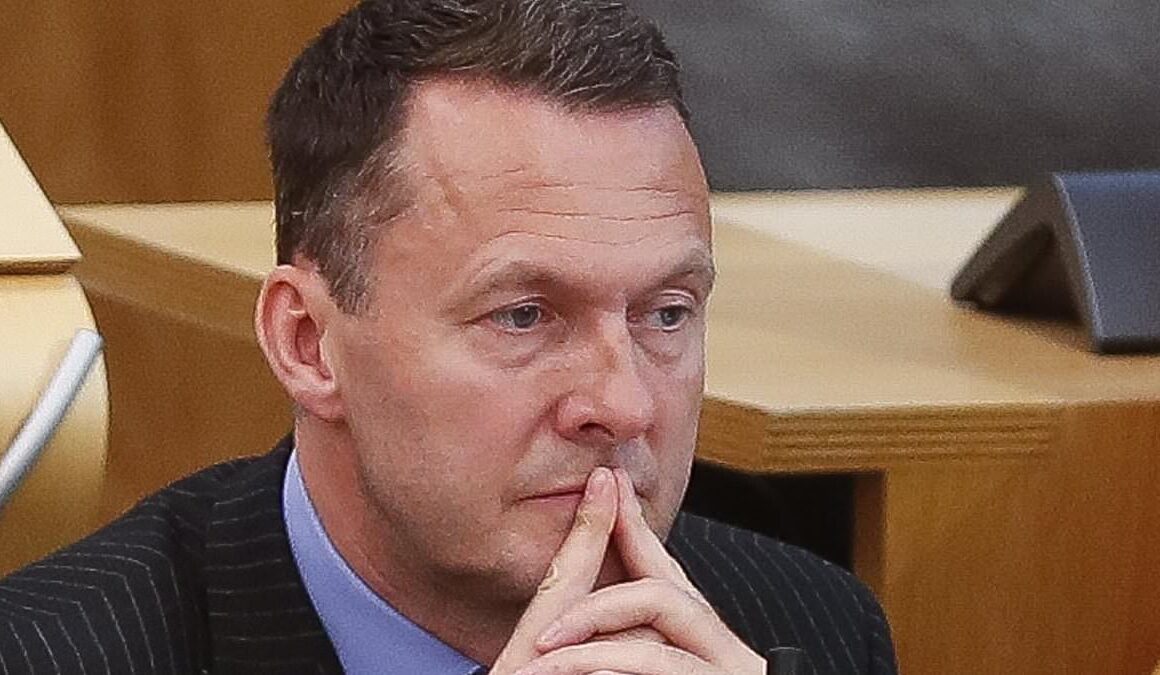Tory leadership hopeful Russell Findlay last night blasted the ‘secretive’ parole process as the gangland thug who attacked him with acid bids to be freed.
William Burns was jailed for 10 years after throwing the corrosive substance at Mr Findlay’s face as he answered the door to his home in December 2015.
Burns, a hired hitman who dressed as a postman and had been carrying a knife during the assault, was before the parole board this week and could have been released within days.
But yesterday Mr Findlay revealed he had been informed there had been ‘no decision made’ and was told the board ‘can’t say why’.
A new parole hearing will now be held in ‘due course’, but the MSP said: ‘They can’t say when, but possibly a couple of months. This is exactly what happened at the June hearing.

Mr Findlay has criticised the Parole Board’s ‘secretive process’ surrounding the man convicted of throwing acid in his face in 2015
‘The entire system is shrouded in secrecy and, if a victim was living in fear, this prolonged and secretive process would hardly help.
‘Time for full parole transparency.’
The delayed decision comes after Mr Findlay was warned by police of a gangster plot to kill him.
The 51-year-old was told about the plan shortly before he launched his bid to lead the Scottish Conservatives.
CID officers told the former journalist they had intelligence that his life was in danger – and the plot may be linked to the failed hit on him nine years ago.
Burns threw sulphuric acid into Mr Findlay’s face on the doorstep of his home just two days before Christmas, but the former journalist managed to overpower his attacker.
At the time of the incident Burns was on early release after being freed before the end of a 15-year jail term for shooting a woman during a post office robber in Linwood, Renfrewshire.
And in 1996 he was locked up for six years for threatening a security guard with a gun after he stole a cake from a Marks and Spencer store in Paisley.
Burns, a career criminal, also has been convicted of charges of assault, firearms and carrying offensive weapons.
When Burns was sentenced in July 2017, Lord Matthews said he had been convicted of a ‘vicious, premeditated attack’.
Lord Matthews told him: ‘You have a bad record and are clearly a dangerous man.’
Under current parole rules offenders who have been sentenced to more than four years in prison are entitled to be considered for parole once they have served half of their sentence.
If the board refuses parole most offenders will be reconsidered for parole no more than 12 months later, every year, until they are released.
Life sentences are dealt with differently – criminals with those are told how long they must serve inside before being eligible for parole.
Board members are appointed by Scottish ministers, but it operates independently from the Scottish Government.
A spokesman for the Parole Board for Scotland said it ‘aims to operate transparently’.
He said: ‘The Parole Board for Scotland is very aware of the potential impact of the parole process on victims and has, over a number of years, taken steps to engage with victims including through the provision of information.
‘Some of the steps that the board has taken unilaterally have subsequently been incorporated into legislation.

Former journalist Mr Findlay was recently warned by police of a fresh gangster plot to kill him
‘The board aims to operate transparently and publishes its guidance for members on the board’s website.
‘This guidance details how the board operates in accordance with the Parole Board (Scotland) Rules 2022.’
Last month Mr Findlay became the first Conservative MSP to announce he was running to succeed Douglas Ross as party leader.
Since 2021 he has been an MSP for the West of Scotland.
After revealing he was warned of the fresh underworld plot to murder him in the Scottish Daily Mail, Holyrood’s parties offered to cooperate on improving security.
Holyrood last had a major review of its security after the fatal stabbing of Southend Conservative MP Sir David Amess in 2021.
More than 250 GPS panic alarms were issued to MSPs and staff and 108 local offices checked by police, who also offered all 129 MSPs home security surveys.
A trial service monitoring the social media abuse of 38 MSPs, which reported 460 comments to the police in 10 months, was made permanent at a cost of £125,000 a year.






